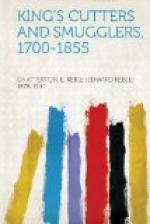2. To take a flint and steel and set fire to a bundle of straw near the edge of a cliff.
3. To burn a blue light.
4. To fire a pistol.
5. The above were all night-signals, but for day-work the craft could signal to the shore or other craft by lowering and raising a certain sail so many times.
There were very many prosecutions for signalling to smuggling craft at many places along our coast. A sentence of six months’ imprisonment was usually the result. Similarly, the Preventive officers on shore used to fire pistols or burn a blue light in signalling to themselves for assistance. The pistol-firing would then be answered by that of other Customs men in the neighbourhood. And with regard to the matter of these signals by the friends of smugglers, the Attorney-and Solicitor-General in 1805 gave their opinion to the effect that it was not even necessary for the prosecution to prove that there was at that time hovering off the coast a smuggling craft, or that one was found to have been within the limits; but the justice and jury must be satisfied from the circumstances and proof that the fire was lit for the purpose of giving a signal to some smugglers.
By the summer of 1807 smuggling in England and Wales had increased to what the Commissioners of Customs designated an “alarming extent.” An Act was therefore passed to ensure the more effectual prevention of this crime, and once again the Revenue officers were exhorted to perform their duty to its fullest extent, and were threatened with punishment in case of any dereliction in this respect, while rewards were held out as an inducement to zealous action. Under this new Act powers were given to the Army, Navy, Marines, and Militia to work in concert with each other for the purpose of preventing smuggling, for seizing smuggled goods, and all implements, horses, and persons employed or attempting to bring these ashore. The lack of vigilance, and even the collusion with smugglers, on the part of Revenue officials was still too real to be ignored. Between Dover and Rye, especially, were tobacco, snuff, spirits and tea run into the country to a very considerable extent. And the Government well knew that “in some of the towns on the coast of Kent and Sussex, amongst which are Hastings, Folkestone, Hythe, and Deal, but more especially the latter, the practice of smuggling is carried on so generally by such large gangs of men, that there can exist no hope of checking it but by the constant and most active vigilance of strong military patrols, with parties in readiness to come to their assistance.” So wrote Mr. W. Huskisson, Secretary of the Treasury, to Colonel Gordon in August 1807.




